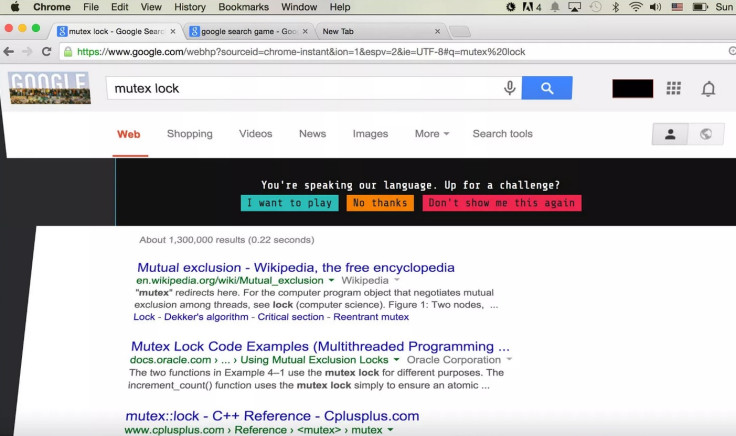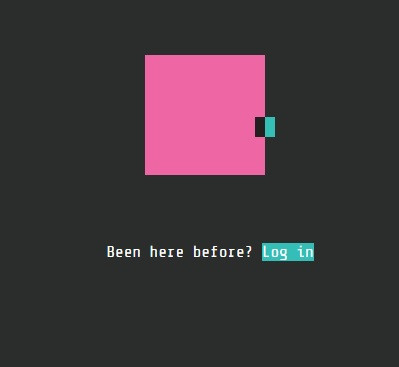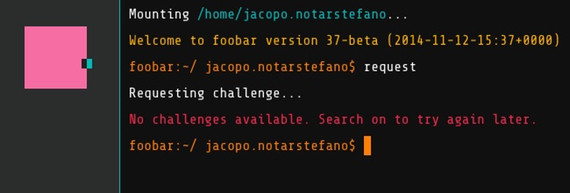Google Foobar: How searching the web earned a software graduate a job at Google

Google uses a secret web tool called foo.bar to recruit new employees based on what they search for online. Specific searches relating to coding and software development prompt Google to ask the user if they are "up for a challenge" in a system which recently landed a college graduate a job at the company.
Three months ago, computer science graduate Max Rosett felt he wasn't ready to apply for a job at Google and lacked the confidence to apply for a full-time software role. But when he searched for "python lambda function list comprehension" he was automatically enrolled on Google's secret hiring process.
Called foo.bar, the system has been used by Google for at least a year and is triggered when a user enters certain search terms relating to coding languages like Python and Java. The search results page breaks open to reveal the message "You're speaking our language. Up for a challenge?" to which the user can decline once, request the message isn't shown again, or click "I want to play".

From there Rosett - and anyone else fortunate to stumble across the right search term - was given a series of programming challenges to solve. He has 48 hours to solve the first problem, which "required a bit of knowledge about algorithms and gave him the option of using Java or Python. Rosett solved the problem in just "a couple of hours...Each time I submitted a solution, foo.bar tested my code against five hidden test cases."
'Puzzles are fun. Search on.'
Rosett solved five more problems over the next two weeks and after a sixth and final puzzle was asked to give his contact details. "I typed in my phone number and email address, fully expecting that to be the end of things." he said in an article for The Hustle. A recruiter then emailed Rosett a few days later, asking for his CV, and Google's more traditional and well-documented recruitment process took over - which includes a full day of problem-solving on a whiteboard at the company's California headquarters.
IBTimes UK asked Google to comment on Rosett's story and it replied with the following:
u0050u0075u007au007au006cu0065u0073u0020u0061u0072u0065u0020u0066u0075u006eu002eu0020u0053u0065u0061u0072u0063u0068u0020u006fu006eu002e
After some searching, we found that this line of hex code reads "Puzzles are fun. Search on."
But what is foo.bar?
Discovered by a Hacker News user in November 2014, the mysterious page was thought to be an obscure promotion for The Imitation Game, a film starring Benedict Cumberbatch as World War 2 code-breaker Alan Turing. The web address 146.148.62.204 still shows a page which looks similar to google.com.foobar - and to what Rosett encountered - but says "this code has been cracked" with the final word linking to The Imitation Game's website.
However, google.com/foobar still appears to be alive and well, but only to users who have previous visited and logged in before. New visitors are redirected to the Google homepage. It seems the only way to get in is to search one of the trigger phrases, like Rosett did, and it is likely that each phrase only works once, as his now returns nothing more than regular search results.

A blog post by Jacopo Notarstefano, a technical student at Cern in Geneva, gives more details on the problems presented by foo.bar, which were updated in January 2015. "Google Foober currently consists of 30 problems articulated in eight levels," Notarstefano says. "One of these problems asks to calculate the number of integer points within a triangle...another problem asks how much water gets trapped in a given landscape, represented by an array of integers...Choosing the right algorithm and implementing it correctly were usually enough to advance to the next level."
But it seems that solving foo.bar isn't always enough to get an interview at Google. Notarstefano ended his post saying: "I don't think anything will come out of this. I don't expect to be called by Google or Foober - but I wouldn't mind!"
As for Rosett, his LinkedIn page says he has been working as a software engineer at Google's headquarters since August 2015.
© Copyright IBTimes 2025. All rights reserved.






















